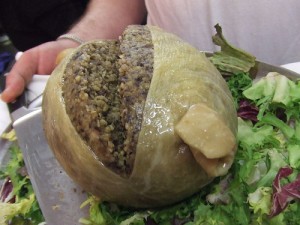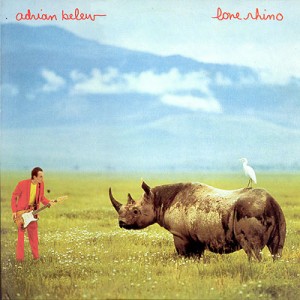Isn’t it time you do your thing? Here’s the place to share trivial observations, links, the death of artists not on your Moderator’s radar, and whatnot. And you may do so sans shirt and while wearing leather chaps.
Tonight is Burns’ Night, the anniversary of Robert Burns‘ birthday, a poet whose work was written in Scots dialect and is largely incomprehensible to anyone reared outside of that beautiful country’s borders. For example, his poem “To A Mouse” begins:
Wee, sleekit, cowrin, tim’rous beastie,
O, what a panic’s in thy breastie!
Thou need na start awa sae hasty,
Wi’ bickering brattle!
I wad be laith to rin an’ chase thee
Wi’ murd’ring pattle!
It is big business north of the border, the culmination of all of the eating and drinking training that has been put in over Christmas and New Year; here in England it is more often than not overlooked unless it is a very slow news day, in which case the telly will be taken over by burly men in kilts explaining why it matters, generally with the benefit of subtitles for the nesh southerners. I am not proud to admit that I know little of the poet’s work, or his life, other than that he died young and that enough wee drams are sunk in his honour to keep the majority of Scottish distilleries in business the whole year round.
Many cultures enjoy a national dish which as soon as they are able to exercise sufficient mental dexterity to poke a nearby animal in the eye with a pencil they are sworn to a solemn promise under pain of losing their place in heaven that they will never admit to any other human being is completely inedible, but which on at least one occasion a year they have to force into their mouths and keep down. These are usually meat-based, and if ever I am faced with them I thank my secular God that I decided to become vegetarian when I left home.
The people of Iceland enjoy the delicacy known as Hakarl, which is shark that has first been buried in sand for 6 to 12 weeks to “ferment” (or “rot” as non-Icelandic people generally describe it), and then dug up again, cut into strips which are hung out to dry for several months. It is washed down with Brennivin, which is schnapps made from potato. A friend and I went to Iceland on holiday many years ago and I have not forgotten the sensation of drinking Brennivin: it is as close to pouring white spirit down ones throat as I ever hope to experience.
On Burns’ Night the people of Scotland enjoy the Haggis, which to a faint-hearted vegetarian like myself appears to be a huge bloated sausage constructed from parts of animals that even Ozzy Osbourne would hesitate to put into his mouth, bulked out with horse food and whatever is left laying about, served with neeps and tatties, which is mashed swede and potato, presumably so that those who are not drunk have something on their plates which they are prepared to eat.
I have found a recipe for a “vegetarian haggis,” which contains ingredients that I not only recognize but would be prepared to put into my mouth, and thought that I would share it…after the jump…with the Hall, in case anyone is stuck for something to cook this evening.
In a recent New Yorker music review of Dangermau5, Sasha Frere-Jones references a music production style that I wasn’t aware of:
The core and tempo of the music are provided by the kick drums and snare drums of disco, often without the high hat. Some producers call it the “Kate Bush” beat: kate (kick) bush (snare), kate (kick) bush (snare).
A drum style named after that English chanteuse? Are there other drum beats or production effects out there that are named after other musicians? Is there an Ig (floor tom) gy (floor tom) Pop (crash)? What would a “Paul Weller” sound like?
I’m just curious and hope that those of you in the know can help us out.
It’s become commonplace for film and television critics to offset a key piece of plot twist information in a review with a SPOILER ALERT! warning. Imagine, if you can, a world in which more than a few thousand rock nerds like us really cared about the twists and turns of a song, those parts people like us find unexpected and exhilarating, like the—SPOILER ALERT!—buzz-heightening typewriter/Phil Manzanera guitar solo that pops up out of the blue in Brian Eno‘s “China My China” or the—SPOILER ALERT!—gravitas-deepening appearance of The Boss, Bruce Springsteen, in Lou Reed‘s “Street Hassle.”
If rock critics found it helpful to add a SPOILER ALERT! to their review of records, what records might call for such a disclaimer?
A recent comment by ladymisskirroyale from this past week’s Saturday Night Shut-In got me thinking about what our long-discussed, long-awaited, direly-needed President of Rock’s Cabinet might look like. Two positions may be filled from the outset. See what you think, and see if you can help us select the future appointees of our eventual President of Rock’s Cabinet.
- Secretary of the Interior: Adrian Belew
- Secretary of Defense: Skunk Baxter
- Secretary of State:
- Attorney General:
- Secretary of Agriculture:
- Secretary of Commerce:
- Secretary of Labor:
- Secretary of Health and Human Services:
- Secretary of Housing and Urban Development:
- Secretary of Transportation:
- Secretary of Energy:
- Secretary of Veterans Affairs:
- Secretary of Homeland Security:
There are three John’s that are peculiarly British to my mind. One is the relatively well-known Folk/Fusion Guitarist and songwriter John Martyn; the second is “Punk Poet” John Cooper Clarke; and the third is a lesser known gem, that is John Otway. Over the next couple of weeks I am going to introduce you to these artists, and I hope you appreciate them for the rarities that they are. I shall start with John Otway, the man who made a success out of failure.
If you know of John Otway at all it will almost definitely be for his calamitous performance on the Old Grey Whistle Test in 1972 and his most successful song, until very recently, “Really Free.” He is often described (mostly by John himself) as rock’s greatest failure, but I strongly disagree with this prognosis and I am sure that you will agree with me in the end. If my sources are correct John Otway’s parents supported him all the way through his “career,” so much so that they even remortgaged their bungalow to fund his escapades
In 1977, the song “Really Free” got to #27 in the charts, which got him a 5-album deal with Polydor Records. The album featured a Wild Willy Barrett on guitar and was produced by Pete Townsend; suffice to say that the album didn’t do very well. Polydor viewed John as a punk act rather than what he actually is, which you will have to decide for yourself. John still performs live, records and writes books to this day, and seems to have as much energy as he ever did and is loved by his loyal fans more than ever.
His self-deprecating style is what makes him peculiar to Britain as well as the subject matter he sings about and the humor that he brings to his performance. However, his exuberance led to a series of disasters early on in his career that he never would be able to overcome, and I think this is what ultimately put the kybosh on any commercial success he could have had. To truly appreciate what a liability John is must be seen to be believed. Following is the infamous 1972 Whistle Test performance that will make everything clear. Please watch before continuing to read as it is genuinely gut-bustlingly hilarious. How Wild Billy Barrett doesn’t kill him is an act of phenomenal restraint. Enjoy!




